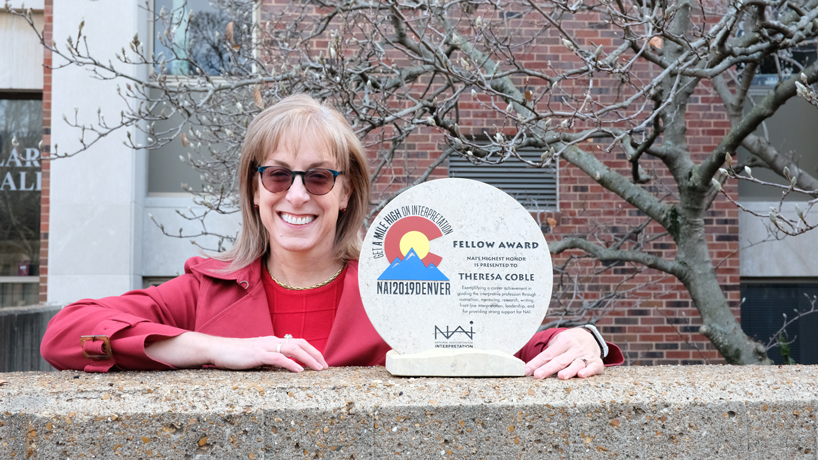
National Association for Interpretation members honored Theresa Coble with the organization’s highest award Friday. Coble’s work focuses on partnering with the National Park Service to educate visitors about important natural, cultural and historical resources. (Photo by Burk Krohe)
Theresa Coble’s career as an educator and interpreter – someone who teaches outside of traditional academic settings – started in the wilderness of Minnesota.
“My undergrad is in biology, and I love nature and the outdoors,” said Coble, E. Desmond Lee Endowed Professor of Experiential and Family Education at the University of Missouri–St. Louis. “As an undergrad, I worked as a canoe guide in the Boundary Waters Canoe Area Wilderness.”
It was a natural fit for her and also a crucial first step in connecting her passions for nature and education.
Over the course of her professional career, Coble has trained those who guide people’s curiosity at sites of historical significance and natural beauty, just as she once guided people through the serene waters of the Land of 10,000 Lakes.
In recognition of her accomplishments, National Association for Interpretation members honored Coble with the 2019 Fellow Award on Friday. It’s NAI’s highest honor and is given only to those who have led the interpretive profession through an exemplary and distinguished career. She accepted the award at the organization’s annual national conference in Denver.
“It’s humbling,” Coble said, recalling her history with NAI. “I went to my first NAI conference in 1998 soon after I started my first tenure-track position at West Virginia University.”
The field of interpretation
The word “interpretation” might bring to mind a person who translates between two languages. However, the interpretation field helps audiences connect to meanings and facilitates local connections at informal learning sites.
NAI members help visitors connect to important natural, cultural and historical resources at places like aquariums, botanical gardens, historical sites, nature centers, parks and zoos. Coble said that visitors are drawn to these sites because they hold meanings and significance.
Visitors might have trouble articulating why they sense layers of meaning, but interpretation can fill in the gaps.
“Interpretation provides access to meaning; it animates people, places, events and ideas. Where there is curiosity and an awareness of place, there are ‘aha’ moments. These ‘aha’ moments can help us form and re-form our identities” Coble said.
She has taken a particular interest in complex topics related to our natural environment.
“Much of my career, I’ve focused on working with the National Park Service, looking at sites of natural and cultural heritage,” she said. “Recently, I’ve become more interested in controversial issues like climate change and race relations and how they’re reflected in our heritage landscapes.”
Facing challenges
Coble’s continued effort to expand access to the interpretation field is one of the primary reasons the NAI recognized her. She’s developed two online graduate programs. The first was a master’s degree in resource interpretation at Stephen F. Austin State University, where she was a faculty member from 2003 to 2015.
“Working with the National Park Service, we helped nurture it into existence,” Coble said. “We probably had 100 master’s students graduate. We made master’s degrees accessible to people who weren’t in major urban areas—people who worked at Yosemite or the Badlands.”
The program was successful in attracting students from rural and isolated regions, because the internet created online learning opportunities. When Coble came to UMSL, she wondered if there might be a similar opportunity.
As it happened, the College of Education has an EdD program that caters to education practitioners – including people like interpreters who plan to use their doctoral degrees outside the classroom.
In 2016, an EdD in heritage leadership for sustainability, social justice and participatory culture, which operates almost entirely online, was launched. By December 2019, 21 students will have graduated and one more is expected to graduate in the near future. A second cohort of 26 students started the program in August of this year.
“I am constantly encouraged by my students. They’re the reason I keep leaning in to do good work,” Coble said.
That work is more important than ever. The 21st century is increasingly complicated, and people are bombarded with information, not all of it reliable. That’s why Coble believes it’s essential to think about education outside of the classroom and across one’s lifespan.
Coble noted that we’re bombarded with conflicting messages about pressing societal issues such as climate change, immigration, equity and inclusion. Professionals at historic sites, national parks and zoos should be prepared to lead constructive conversations about these topics.
“Heritage leadership helps us think about these challenges in new ways and then pivot toward meaningful action,” Coble said. “It’s creating safe spaces or forums where people can come together and have a dialogue or take action.”
An uncharted journey
For all of Coble’s contributions, it wasn’t a given that she would end up as an educator or interpreter.
Her academic career began with a bachelor’s degree in biology, and after graduating, an urge to travel took her to China. She taught English in Liaocheng, Shandong Province for four years before returning to the U.S. and earning a master’s degree in Chinese at the University of Minnesota.
These experiences sparked an interest in teaching, but Coble wasn’t sure what she wanted to do next. With the encouragement of a faculty member at UMN, she tapped into her love of the outdoors and pursued a PhD in forestry.
In a field so tied to lived experiences, Coble feels fortunate to have gone through her academic journey. It’s resulted in an endowed professorship and NAI Fellow award, but she conceded it’s tough to beat paddling a canoe in the Boundary Waters.
“I was 19, and I said, ‘I’m never going to have a better job than canoe guiding in the Boundary Waters,’” she said. “In some ways it’s true, and yet every single step along the way, I’ve been so fortunate.”














